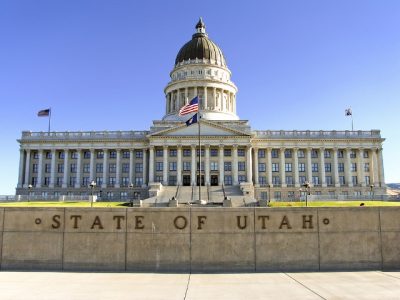Immigration Benefits and Relief
The immigration laws and regulations provide some avenues to apply for lawful status from within the U.S. or to seek relief from deportation. The eligibility requirements for these benefits and relief can be stringent, and the immigration agencies often adopt overly restrictive interpretations of the requirements. Learn about advocacy and litigation that has been and can be undertaken to ensure that noncitizens have a fair chance to apply for the benefits and relief for which they are eligible. Providing avenues for legal status, protection, and family reunification is vital to ensuring humanitarian protection for immigrants. We are leading policy changes that open more opportunities like asylum, visas for victims of crime or human trafficking, and relief for long-term residents. Explore the resources below to learn more.

In Presidential Election, “Self-Deportation” Goes Down to Defeat
It did not become certain until late Tuesday night that President Obama would win re-election. But for Mitt Romney, the campaign may have been lost during the Republican primary, when he cited “self-deportation” as the solution to our nation’s immigration problems. With the post-election dust now settled, it has become increasingly clear that supporting the idea is not only bad as a matter of policy, but also a losing political strategy. Read More

Elections Demand a New Way Forward on Immigration
Even before the election was called for President Obama last night, pundits and pollsters were remarking on the fact that immigration—or more specifically, anti-immigrant policies—were a death knell for Mitt Romney. Today, the analysis of whether and how the Republican party recovers from its devastatingly poor showing among Latinos—the key demographic group of the 21st century—is also focusing on immigration. CNN’s David Gergen noted that immigration reform would become a reality because Democrats want it and Republicans need it; even Fox news commentators grumpily acknowledged that immigration reform has got to be on the table now. Read More

Could DACA Have Happened Without Public Engagement at USCIS?
Approximately two months after the program opened, nearly 200,000 individuals have submitted requests for grants under the Deferred Action for Childhood Arrivals (DACA) imitative. It’s still too early to assess the overall success of the program or evaluate the grant rates, but it isn’t too early to take note of the important role that preparation played in making DACA a reality. Read More

Associated Press Issues Misleading Defense of Term “Illegal Immigrant”
Unlike lawyers and policymakers, journalists have an obligation to use language that ordinary people understand. Although the practice is generally helpful, it can sometimes result in oversimplification, or sacrificing accuracy for the sake of supposed clarity. A perfect example is the memo issued by the Associated Press last week endorsing use of the term “illegal immigrant.” Read More

Immigration (Finally) Takes the Stage at a Presidential Debate
George W. Bush made several appearances in last night’s presidential debate, but perhaps nowhere with greater effect than when President Obama contrasted Governor Mitt Romney’s position on immigration reform. Where President Bush supported comprehensive immigration reform, declared President Obama, Governor Romney supports “self-deportation” and Arizona style anti-immigrant laws. Moderator Candy Crowley then segued into a direct immigration question from an undecided voter about Romney’s plans for dealing with the 11 million undocumented immigrants living in our nation. The next few minutes revealed a great deal about both candidates’ positions on the immigration question, but perhaps more importantly, the points where the candidates challenged each other suggest that both parties recognize they must begin talking about immigration in new ways. Read More

Pace of DACA Approvals Quickens, but Will it be Fast Enough?
For the first time since immigration authorities officially launched Deferred Action for Childhood Arrivals in mid-August, the federal government released statistics last Friday indicating that thousands of requests have been officially granted. But while the figures themselves are an encouraging sign, other evidence suggests that most applicants will not have their requests considered until after the next presidential inauguration in January, if at all. Read More

Who and Where the DREAMers Are, Revised Estimates
There are roughly 1.8 million immigrants in the United States who might be, or might become, eligible for the Obama Administration’s “deferred action” initiative for unauthorized youth brought to this country as children. Read More

Naturalized Citizens Have the Power to Swing Elections
There is no doubt that immigrants are a force to be reckoned with in this year’s presidential race. After all, the Obama administration unveiled its Deferred Action for Childhood Arrivals (DACA) program in June, just a couple of months before the official start of the campaign. And Republican presidential nominee Mitt Romney has said that, if elected, he will not deport DACA beneficiaries (although he says he will discontinue the program). In other words, both candidates are going out of their way to woo immigrant voters—that is, naturalized U.S. citizens who are eligible to vote—as well as those second and third generation Americans for whom immigration is still a highly personal issue. This is smart politics. Given that the presidential election could be decided by the most razor-thin of margins, the ballots cast by naturalized citizens could prove decisive, especially in the handful of swing states upon which the election will probably hinge. Read More

Utah Attorney General Pushes Sensible Immigration Policies
Republican Utah Attorney General Mark Shurtleff has become a poignant and effective advocate for smart immigration policies, including the DREAM Act. On Monday, Shurtleff spoke at the Immigration Law and Policy Conference, in Washington D.C., where he concluded that the “biggest casualty in the immigration debate is the truth.” Shurtleff understands prosecutorial discretion, and is firmly behind the Obama Administration’s recent decisions to exercise prosecutorial discretion for immigrant youth (Deferred Action for Childhood Arrivals, DACA) and in cases where the individuals are not enforcement priorities. Shurtleff went on to describe Utah’s recent immigration legislation, which includes an enforcement law, as well as a provision that creates a state guestworker program. He explained that he is still in conversations withthe federal government about how Utah can exercise prosecutorial discretion for unauthorized “guestworkers” and the employers who hire them. Read More

Legal Action Center Welcomes Ninth Circuit’s Decision on Child Status Protection Act
An en banc panel of the Ninth Circuit Court of Appeals ruled in favor of young adults who, due to long delays caused by visa backlogs, lost the opportunity to obtain their green cards before they turned 21. In accordance with arguments made in an amicus brief submitted by the… Read More
Make a contribution
Make a direct impact on the lives of immigrants.
